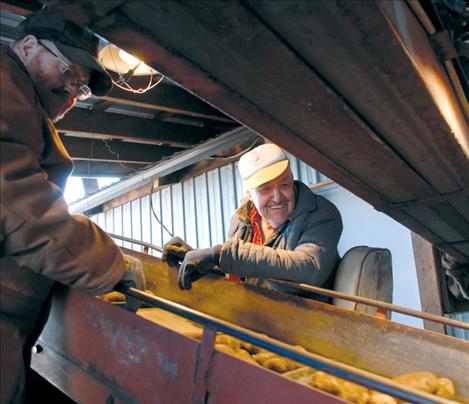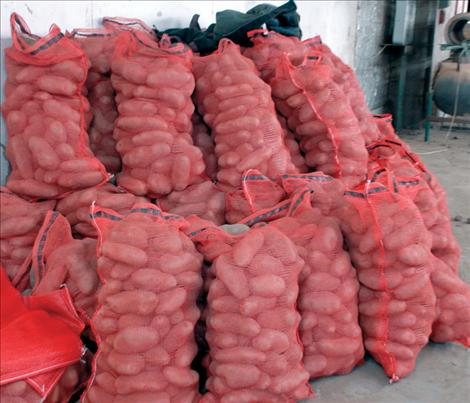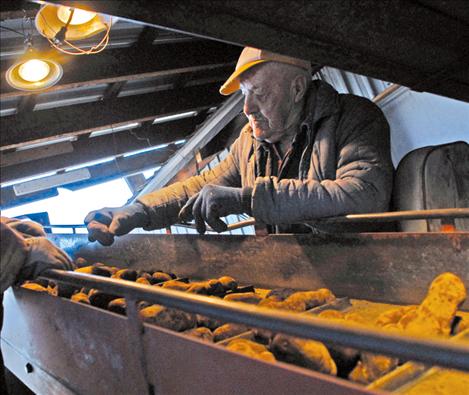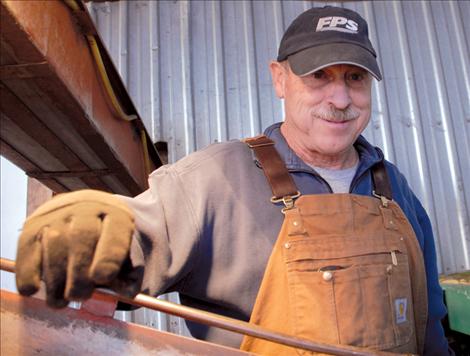Charlo man still sorting spuds after 50 years
Hey savvy news reader! Thanks for choosing local.
You are now reading
2 of 3 free articles.
PABLO — Harold Kent stands on one side of the conveyor belt loading Fleming Farms potatoes onto a semi-truck, and his nephew, Sam Kent, stands on the other.
When Harold guides the conveyor belt out over the waiting truck and pulls the lever, the russet potatoes start rolling.
“They (the crew) can’t start until I get ready,” he said, pulling on his gloves.
Between Harold and Sam they’ve got lots of years of experience, with Harold contributing 50 years. He’s worked for Fleming Farm sorting potatoes for 50 years, and this year he turns 91.
He’s got a sore shoulder, but he still shows up almost every day the Flemings ship spuds.
“I had therapy this morning before I came to work,” he said, with a smile. He’s had three shoulder surgeries and said his therapist suspects he has a bone spur.
“Harold has always been my favorite uncle,” Sam said. “He’s a just a really great guy.”
Harold commutes from Charlo and Sam from St. Ignatius so they eat lunch together while the rest of the crew goes home.
Working spring and fall in the potato fields, Harold also was a heavy-equipment operator for 30 years. He moved to Charlo from Jackson, Idaho.
Harold and Sam wear coveralls, caps, sturdy work boots and surgical gloves as they keep a keen eye on the spuds rolling up the conveyor belt. They, too, are picking out small potatoes, rotten potatoes, rocks, second-growth and oddly shaped spuds.
The tubers have already survived a trip through the only indoor grading facility in Lake County, according to Harold.
The small potatoes go on an overhead conveyor belt to a separate truck for transport to a factory that makes tater tots, owner Pat Fleming said.
The whole operation runs smoothly. Dump trucks deliver potatoes from the cellar to the beginning of the conveyor belts. The first leg shakes off dirt.
Inside the grading facility, a nine-person crew sorts, picking out dirt clods, rocks, rotten potatoes, malformed and second-growth spuds. Potatoes smaller than one and a half inches are placed on a separate conveyer, and potatoes larger than 12 inches go into a net bag to sell as bakers.
Two young men with wheelbarrows rake up the dirt and tiny potatoes and transport them to piles outside.
One worker said the ideal seed potato can be cut so each planted portion has three “eyes,” so three potato plants sprout.
After the spuds progress outside to Harold and Sam, Pat joins the crew, and they all sort for any imperfections.
Cammy Maughan, the state potato inspector, gathers a 20-pound sample from each 10,000 pounds of potatoes shipped. She looks for over or undersized potatoes, any defect, such as rotten, cut or second-growth potatoes, and records them. If a potato seems to have a rotten spot, Maughan slices into it to see if it’s rotten or a bad spot.
The Flemings, located south of Pablo, send “a couple hundred trucks out” each year, according to Pat. Each truck hauls about 30,000 pounds of seed potatoes to Quincy, Wash.
The truck drivers estimate the journey takes about four and a half hours if the roads are good.
Fleming Farms has been in operation since the 1950s, when Paul and Jim Fleming began farming with 15 acres. They split in the 1960s, and each grew their own crops.
Now the farm’s run by Pat and Neil Fleming. They buy many of their seed potatoes from Art Mangels, who used to farm in the area but now lives near Dillon.
“The potatoes are looking real good,” Maughan said.



















